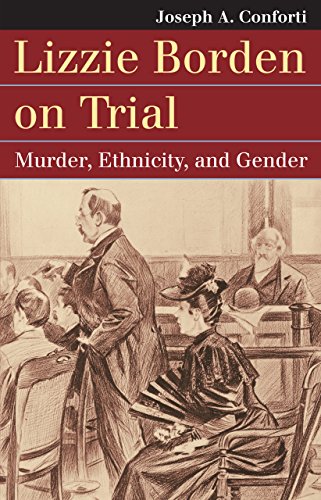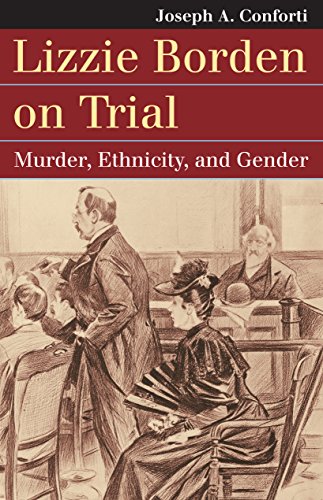-
Lizzie Borden on Trial: Murder, Ethnicity, and Gender
Joseph A. Conforti
Paperback (University Press of Kansas, Feb. 2, 2016)Most people could probably tell you that Lizzie Borden "took an axe and gave her mother forty whacks," but few could say that, when tried, Lizzie Borden was acquitted, and fewer still, why. In Joseph A. Conforti's engrossing retelling, the case of Lizzie Borden, sensational in itself, also opens a window on a time and place in American history and culture. Surprising for how much it reveals about a legend so ostensibly familiar, Conforti's account is also fascinating for what it tells us about the world that Lizzie Borden inhabited. As Conforti—himself a native of Fall River, the site of the infamous murders—introduces us to Lizzie and her father and step-mother, he shows us why who they were matters almost as much to the trial's outcome as the actual events of August 4, 1892. Lizzie, for instance, was an unmarried woman of some privilege, a prominent religious woman who fit the profile of what some characterized as a "Protestant nun." She was also part of a class of moneyed women emerging in the late 19th century who had the means but did not marry, choosing instead to pursue good works and at times careers in the helping professions. Many of her contemporaries, we learn, particularly those of her class, found it impossible to believe that a woman of her background could commit such a gruesome murder. As he relates the details, known and presumed, of the murder and the subsequent trial, Conforti also fills in that background. His vividly written account creates a complete picture of the Fall River of the time, as Yankee families like the Bordens, made wealthy by textile factories, began to feel the economic and cultural pressures of the teeming population of native and foreign-born who worked at the spindles and bobbins. Conforti situates Lizzie's austere household, uneasily balanced between the well-to-do and the poor, within this social and cultural milieu—laying the groundwork for the murder and the trial, as well as the outsize reaction that reverberates to our day. As Peter C. Hoffer remarks in his preface, there are many popular and fictional accounts of this still-controversial case, "but none so readable or so well-balanced as this."
-
Lizzie Borden on Trial: Murder, Ethnicity, and Gender
Joseph A. Conforti
eBook (University Press of Kansas, June 8, 2015)Most people could probably tell you that Lizzie Borden "took an axe and gave her mother forty whacks," but few could say that, when tried, Lizzie Borden was acquitted, and fewer still, why. In Joseph A. Conforti's engrossing retelling, the case of Lizzie Borden, sensational in itself, also opens a window on a time and place in American history and culture. Surprising for how much it reveals about a legend so ostensibly familiar, Conforti's account is also fascinating for what it tells us about the world that Lizzie Borden inhabited. As Conforti—himself a native of Fall River, the site of the infamous murders—introduces us to Lizzie and her father and step-mother, he shows us why who they were matters almost as much to the trial's outcome as the actual events of August 4, 1892. Lizzie, for instance, was an unmarried woman of some privilege, a prominent religious woman who fit the profile of what some characterized as a "Protestant nun." She was also part of a class of moneyed women emerging in the late 19th century who had the means but did not marry, choosing instead to pursue good works and at times careers in the helping professions. Many of her contemporaries, we learn, particularly those of her class, found it impossible to believe that a woman of her background could commit such a gruesome murder. As he relates the details, known and presumed, of the murder and the subsequent trial, Conforti also fills in that background. His vividly written account creates a complete picture of the Fall River of the time, as Yankee families like the Bordens, made wealthy by textile factories, began to feel the economic and cultural pressures of the teeming population of native and foreign-born who worked at the spindles and bobbins. Conforti situates Lizzie's austere household, uneasily balanced between the well-to-do and the poor, within this social and cultural milieu—laying the groundwork for the murder and the trial, as well as the outsize reaction that reverberates to our day. As Peter C. Hoffer remarks in his preface, there are many popular and fictional accounts of this still-controversial case, "but none so readable or so well-balanced as this."
-
Winchester and Friends: James Takes a Hike
Joseph Conforti
language (, April 26, 2020)It’s been said that children today are “penned in” by too much structure. Whatever happened to the phrase “go out and play?” Have our neighborhoods simply become “dormitories with trees?" It shouldn’t take a pandemic and quarantine to make us realize how important connecting with the great outdoors is to the development of a child’s mind and spirit. In this digital world of computers, tablets and smartphones, young James leaves the confines of his home to take a hike in the verdant hills surrounding his neighborhood. Here he learns a simple and fun lesson from his good friend Winchester the Mouse and all his other animal friends. This short tale hopes to inspire children to get up and out, even for just a quick walk in the woods.
-
Lizzie Borden on Trial: Murder, Ethnicity, and Gender
Joseph A. Conforti
Hardcover (University Press of Kansas, June 8, 2015)Most people could probably tell you that Lizzie Borden "took an axe and gave her mother forty whacks," but few could say that, when tried, Lizzie Borden was acquitted, and fewer still, why. In Joseph A. Conforti's engrossing retelling, the case of Lizzie Borden, sensational in itself, also opens a window on a time and place in American history and culture. Surprising for how much it reveals about a legend so ostensibly familiar, Conforti's account is also fascinating for what it tells us about the world that Lizzie Borden inhabited. As Conforti—himself a native of Fall River, the site of the infamous murders—introduces us to Lizzie and her father and step-mother, he shows us why who they were matters almost as much to the trial's outcome as the actual events of August 4, 1892. Lizzie, for instance, was an unmarried woman of some privilege, a prominent religious woman who fit the profile of what some characterized as a "Protestant nun." She was also part of a class of moneyed women emerging in the late 19th century who had the means but did not marry, choosing instead to pursue good works and at times careers in the helping professions. Many of her contemporaries, we learn, particularly those of her class, found it impossible to believe that a woman of her background could commit such a gruesome murder. As he relates the details, known and presumed, of the murder and the subsequent trial, Conforti also fills in that background. His vividly written account creates a complete picture of the Fall River of the time, as Yankee families like the Bordens, made wealthy by textile factories, began to feel the economic and cultural pressures of the teeming population of native and foreign-born who worked at the spindles and bobbins. Conforti situates Lizzie's austere household, uneasily balanced between the well-to-do and the poor, within this social and cultural milieu—laying the groundwork for the murder and the trial, as well as the outsize reaction that reverberates to our day. As Peter C. Hoffer remarks in his preface, there are many popular and fictional accounts of this still-controversial case, "but none so readable or so well-balanced as this."
-
Jonathan Edwards, Religious Tradition, and American Culture
Conforti
Paperback (The University of North Carolina Press, Nov. 20, 1995)As the charismatic leader of the wave of religious revivals known as the Great Awakening, Jonathan Edwards (1703-58) is one of the most important figures in American religious history. However, by the end of the eighteenth century, his writings were generally dismissed as remnants of a moribund Puritan tradition. Focusing on the publishing history and appropriation of Edwards's works by succeeding generations, Joseph Conforti explores the construction and manipulation of the Edwards legacy and demonstrates its central place in American cultural and religious history. Most of Edwards's writings were not regularly republished or widely read until the early nineteenth century, when he emerged as a prominent thinker both in academic circles and in the new popular religious culture of the Second Great Awakening. Even after the Civil War, Edwards remained a popular figure from the Puritan past for colonial revivalists. But by the early twentieth century, scholars had again reinvented Edwards, this time deemphasizing his influence. These contrasting constructions of the one man, Conforti says, reveal the dynamic process of cultural change.
-
Lizzie Borden on Trial: Murder, Ethnicity, and Gender
Joseph A. Conforti
Hardcover (University Press of Kansas (2015-06-08), March 15, 1656)None